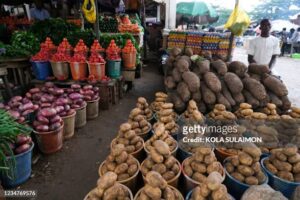The House of Representatives on Wednesday urged the Federal Government to urgently implement the Export (Prohibition) Act of 2004 as part of efforts to curb the smuggling of food items and address the growing food insecurity across the country.
This resolution was passed following the adoption of a motion sponsored by Hon. Muktar Shagaya, who criticized the failure of successive governments to implement relevant legislation.
The lawmakers also tasked the Federal Ministry of Agriculture and Food Security with introducing more incentives to encourage farmers and enhance agricultural production.
In his lead debate, Hon. Shagaya emphasized that the primary purpose of government is to provide security and welfare for the people, as enshrined in Section 14(2b) of the 1999 Constitution (as amended).
He lamented, “Nigeria is currently experiencing high levels of food insecurity, food inflation, and food shortages. This situation has led to millions of citizens lacking access to sufficient and nutritious food, resulting in untold hardship, hunger, and misery among the population.”

The House expressed concern over reports from the World Bank and the International Rescue Committee (IRC) indicating that over 31.8 million Nigerians—approximately 16% of the population—are currently facing severe food insecurity and malnutrition, particularly among women and children.
The lawmakers noted that food smuggling and exportation are major drivers of the current food insecurity, as large quantities of food products are smuggled out of the country, undermining agricultural output and threatening the livelihoods of farmers.
“The Export (Prohibition) Act, 2004 was passed at a time when many Nigerians could not acquire basic necessities like rice, corn, yam, garri, cassava, and beans because these goods were being covertly transported to foreign markets. This situation is comparable to what we are experiencing today,” Hon. Shagaya stated.
He further warned that the failure to enforce this legislation over time has led to severe food shortages, high food prices, increased food insecurity, and loss of revenue for both farmers and the federal government.
The House recognized the urgent need to address the current food crisis by enforcing the Export (Prohibition) Act, 2004 to prevent food exportation, ensure food availability, and reduce the cost of living for Nigerians.
To this end, the House urged the Federal Government to implement the Export (Prohibition) Act, 2004 as a matter of urgency to curb food smuggling and food insecurity in Nigeria.
Additionally, the lawmakers called on the Federal Ministry of Agriculture and Food Security to provide more incentives for farmers to boost agricultural production and productivity.
Consequently, the House mandated the joint Committees on Agricultural Production and Services and Legislative Compliance to ensure compliance and report back within four weeks for further legislative action.




